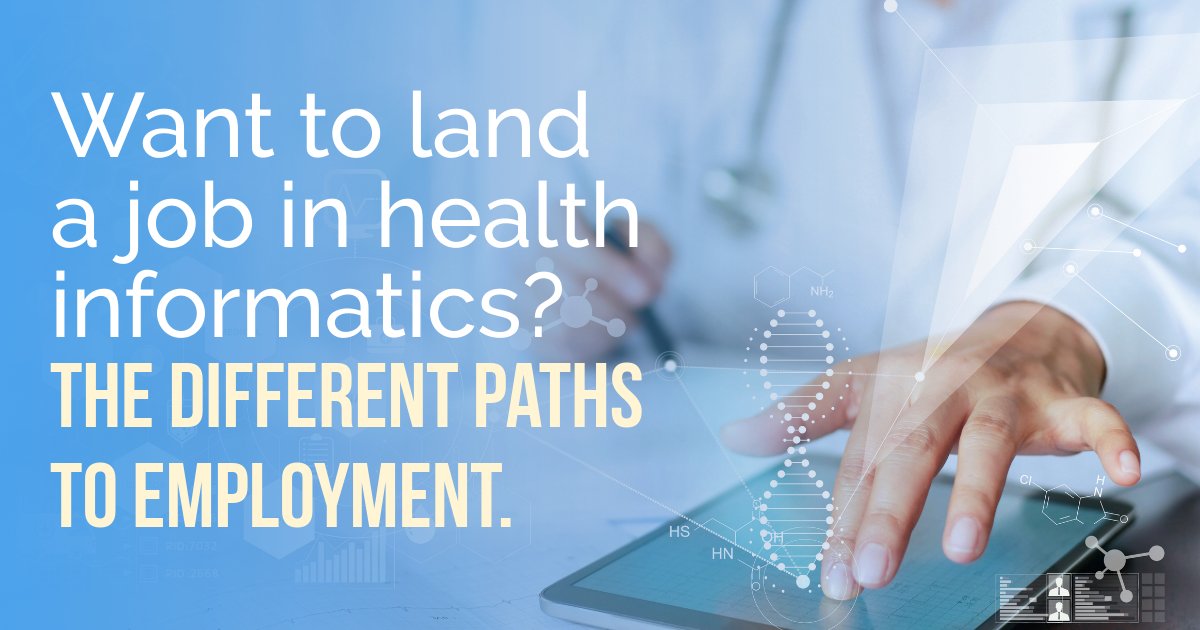As data and technology continue to drive the evolution of the health care industry, the demand for health care informatics experts has risen steadily. And with the widespread adoption of electronic medical records and other technologies that generate troves of data, job openings in health care informatics are increasing across the industry – including hospitals, clinics, technology firms, insurance companies, and private physician offices. According to the U.S. Bureau of Labor Statistics, career opportunities for medical records and health information technicians are expected to increase by 13% from 2016 to 2026.
So how do you land a job in the growing health informatics field? While the jobs are plentiful, in order to qualify for the positions with the highest growth and earning potential, you will likely need to have a unique combination of experience and education.
The Paths to a Career in Health Informatics
As the demand for health informatics professionals has increased, so too has the number of people with a wide variety of skills and job backgrounds entering the field. Here are a few of some of the most common backgrounds and/or demographic groups that are moving into the health informatics field:
Military/Veterans
There are a number of active military members and military veterans who have been exposed to health informatics while working in a military or VA hospital or clinic. As large integrated systems utilize unified patient medical record systems, both the military and the VA Health System have seen an increased need for health informatics professionals.
Foreign Medical Graduates Living in the US
According to the American Medical Informatics Association, employers in the health care field are actively seeking professionals who have a strong health background with equal technological and analytical skills. And because it can be very difficult for foreign medical school graduates to pass the lengthy licensure and residency requirements to become credentialed to practice in the United States, a career in health informatics is an excellent option. With a master’s degree in health informatics paired with a medical degree, foreign medical graduates become excellent candidates for a number of positions in this field.
Early Careerists/Career Changers
The level of current and projected job growth in the health care field is well known. But did you know that behind the medical field, many reports state that technology is the next best career field for the future? This promising forecast means that a career that marries these two disciplines — i.e. health informatics — is a wise choice for many, including early careerists and career changers. Shifting gears and moving into a whole new career in health informatics is not impossible. Because this is such a unique field of study, completing a HIMSS-approved graduate program that provides focused coursework on key health information and technology concepts, as well as health system leadership and project management fundamentals, can not only prepare an early careerist for certification but also serve as an excellent foundation for landing your first position.
Clinical Care
If you are an MD, nurse, pharmacist or other clinical provider looking to expand (or shift) your career and move into a new role, a master’s degree in health care informatics can be quite appealing. Not only will a graduate degree in health care informatics build upon your current health care knowledge and years of clinical experience but it will allow you to expand your career beyond direct patient care. Your background in medicine and clinical care has provided an ideal educational and experiential foundation to succeed in health informatics.
Health Information Management
Health information management professionals such as medical coders, billers, and documentation specialists frequently interact with and generate the data sets that health informatics professionals utilize, but in a different capacity. If you’re interested in taking on more of a leadership role, a health informatics master’s degree can teach you the skills needed to interpret, analyze and secure large sets of medical data, optimize clinical documentation systems and workflows, and develop other data-driven solutions to improve patient care.
Why You Should Get a Master’s Degree in Health Informatics
With the shift to value-based care, there is a pressing need for qualified health informatics professionals to help organizations improve the quality of care they provide while decreasing costs. Value-based care relies on collecting and analyzing vast amounts of data, which is helping to drive health informatics job growth.
This is good news for professionals who hold a health informatics master’s degree — the current and future career landscape will expand and give those with a master’s degree many options when it comes to choosing a profession. Master’s level informatics professionals may consider multiple jobs in health care informatics such as health informatics director, chief medical information officer, health informatics consultant, clinical data analyst, health information resource manager, health information system application designer and compliance officer.
Also, as the list of potential career paths within the health informatics field expands, many universities have developed specialized coursework within the degree offerings to help students focus on a specific area of interest. Depending on your career goals, you might want to specialize in health data analytics, population health, or health care leadership and administration. Every master’s degree program is structured differently, with different course offerings, so make sure that the program you select offers classes that closely align with your interests and that prepare you with the skills you’ll need to succeed in the field.
[RELATED] How to Choose the Best Health Informatics Degree Program >>
When evaluating health informatics graduate programs, be sure to look for schools that are regionally accredited, partner with HIMSS, and offer a practical curriculum that integrates health information management, clinical analytics, information technology, and health system management. The right master’s degree in health informatics can set you apart from the competition and help demonstrate your knowledge and understanding of the health informatics field.


